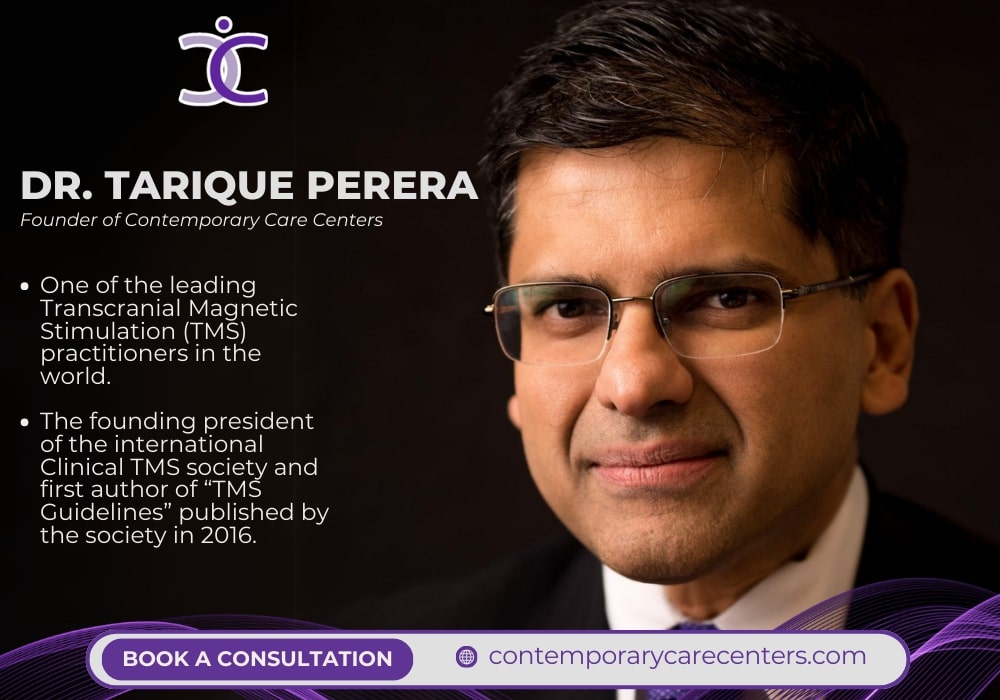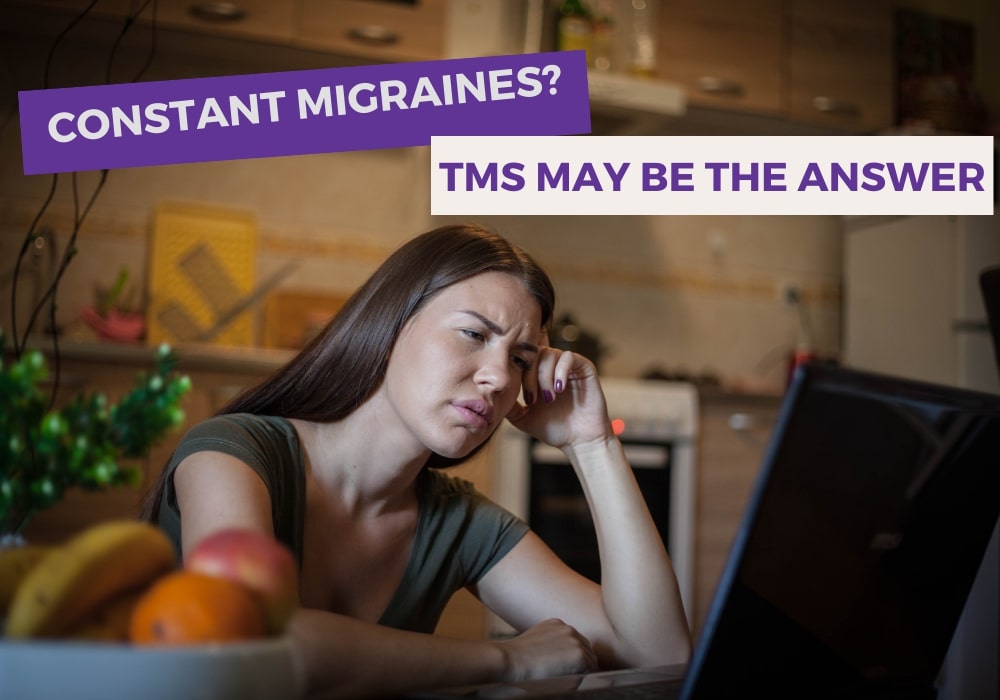Say goodbye to relentless migraines—discover how TMS therapy is transforming lives when traditional treatments can’t deliver!
Migraines are excruciating and can interfere with the ability to go about their usual activities in search of a cure. Sometimes conventional medicine fails to deliver results, so many people here are frustrated and see no other way. And that is where TMS therapy comes in as a treatment to help out.
This non-invasive, innovative approach has shown promise for those struggling with chronic migraines. In this article, we’ll explore who can benefit from TMS therapy and how it could provide lasting relief for migraine sufferers.
What Is TMS Therapy For Migraines?
TMS therapy is a non-invasive treatment that uses magnetic pulses to stimulate nerve cells in the brain.
Deep TMS, as well as rTMS, is a revolutionary method of treatment situated at the pinnacle of the healthcare industry, TMS therapy is a significant innovation in the field. It works with a magnetic coil produced to be positioned on the scalp. So that it can give brief magnetic stimuli to particular regions of the head, particularly the brain.
This stimulation aims at sending impulses to nerve cells to help balance activity in the brain and to ease disorders such as chronic migraines and depression.
Key points about TMS therapy:
- Approved by the FDA for treating migraines, major depressive disorder, and other mental health conditions.
- A safe and noninvasive procedure with minimal side effects, such as mild scalp discomfort during treatment.
How Does TMS Therapy Help with Migraines?
TMS therapy helps with migraines by stimulating brain activity, reducing pain intensity, and decreasing the frequency of attacks.
Migraines are believed to involve cortical spreading depression, changes in cortical excitability, and abnormal pain pathways. TMS therapy addresses these issues by stimulating the motor cortex and dorsolateral prefrontal cortex, reducing migraine symptoms like headache pain and aura.
Research, including systematic reviews and randomized controlled trials, shows TMS can:
- Interrupt cortical spreading depression, a key trigger for migraine aura and episodes.
- Decrease migraine severity and pain intensity.
- Act as a preventive treatment for chronic headaches and migraines.
Who Is a Good Candidate for TMS Therapy?
TMS therapy is ideal for those with chronic migraines who have not responded to traditional treatments.
TMS therapy may benefit:
- Chronic migraine sufferers: Individuals experiencing frequent or severe headaches that disrupt daily life.
- Treatment-resistant patients: Those who haven’t found relief through prescription medications or other treatments like electroconvulsive therapy or prophylactic treatment.
- Patients with medical conditions: Migraine patients with comorbidities like depression symptoms, bipolar disorder, or obsessive-compulsive disorder may also see fewer depressive symptoms with TMS therapy.
Checklist for Candidacy:
- Have you tried other treatments without success?
- Do you suffer from chronic migraines or severe headaches?
- Are you seeking a noninvasive treatment with minimal side effects?
If you answered “yes,” TMS therapy might be right for you.
Who May Not Be Suitable for TMS Therapy?
Individuals with metal implants, seizure disorders, or specific medical conditions may not be suitable for TMS therapy.
While TMS therapy is safe for most, it’s not recommended for:
- People with metal implants in their head or neck.
- Those with conditions like seizure disorders or epilepsy.
- Pregnant individuals, depending on their health provider’s advice.
Consult a specialist to confirm if TMS is a suitable option for your migraine management.
Benefits of TMS Therapy for Migraine Sufferers
TMS therapy provides a non-invasive, drug-free solution to reduce migraine frequency while addressing depression symptoms often linked with migraines. It offers lasting relief with minimal side effects, helping patients regain control of their lives.
Key benefits include:
- Noninvasive therapy: No surgery or hospital stays required.
- Long-term relief: Reduces migraine frequency over time.
- Minimal side effects: Occasional scalp discomfort during treatment sessions is temporary and manageable.
- Dual benefit: Addresses depression symptoms often linked with chronic migraines.
What to Expect During a TMS Therapy Session?
During a TMS therapy session, expect a painless, noninvasive procedure involving magnetic pulses to stimulate targeted brain areas.
During a TMS therapy session, you’ll sit comfortably while a magnetic coil is placed against your scalp. The coil delivers brief magnetic pulses to stimulate specific brain areas associated with mood regulation or pain relief.
The procedure is non-invasive, painless, and typically lasts 20-40 minutes. Most patients can return to their daily activities immediately after the session, making it a convenient treatment option.
Can TMS Therapy Be Used with Other Treatments?
TMS therapy can complement other treatments, enhancing effectiveness while addressing both mental health and physical symptoms.
Here’s how TMS can be used with other treatments:
- Combining with Medications: TMS therapy can be used alongside antidepressants or migraine medications for improved outcomes.
- Supporting Psychotherapy: It enhances the benefits of counseling by addressing underlying brain activity issues and improving mental health progress.
- Integrating Preventive Therapies: TMS can be part of a broader plan that includes lifestyle changes and preventive strategies to manage chronic migraines effectively.
What Is the Difference Between rTMS and Deep TMS?
rTMS targets surface brain regions, while Deep TMS penetrates deeper, offering broader stimulation for specific conditions.
- Repetitive Transcranial Magnetic Stimulation (rTMS): Uses repetitive magnetic pulses to target surface areas of the brain.
- Deep Transcranial Magnetic Stimulation (Deep TMS): Penetrates deeper into brain tissue, offering broader stimulation.
Both rTMS and Deep TMS are non-invasive procedures, but their applications may vary based on the patient’s needs and the condition being treated. Deep TMS is often preferred for more complex cases requiring deeper brain stimulation. While rTMS is commonly used for conditions that respond well to surface-level targeting.
Both approaches have shown success in reducing symptoms and improving quality of life.

Take the First Step Toward Better Mental Health with Contemporary Care Centers
At Contemporary Care Centers, we are dedicated to providing comprehensive mental health services tailored to meet your unique needs. Our team of experienced professionals offers a range of treatments designed to support your journey toward well-being.
Our services include:
- Medication Management: Our clinicians, trained at prestigious institutions such as Harvard, Columbia, and Yale, specialize in psychopharmacology to ensure effective medication strategies.
- Transcranial Magnetic Stimulation (TMS) Therapy: As a leading TMS practice, we offer advanced treatments like Theta Burst TMS to stimulate underactive brain areas associated with depression.
- Spravato®/Ketamine Therapy: We are a top provider of SPRAVATO® (esketamine) therapy, offering innovative solutions for treatment-resistant depression.
- Psychotherapy/Counseling: Our empathetic team provides various therapeutic modalities to address diverse mental health concerns.
- Telehealth Services: For your convenience, we offer remote mental health services, allowing you to receive care from the comfort of your home.
We accept most major insurance plans, including Medicare, to make our services accessible to all in need.
Take the first step toward a healthier, happier life. Contact us today at (203) 792-0400 to schedule an appointment or visit our website at contemporarycarecenters.com to learn more about how we can support your mental health journey.
FAQs
How effective is TMS for migraines?
Studies show a significant reduction in migraine severity and frequency for many patients.
Is TMS therapy safe?
Yes, it’s a noninvasive treatment with minimal side effects like mild scalp discomfort.
Does insurance cover TMS therapy?
Many health insurance companies cover TMS for migraines and mental health conditions.
Can I continue other treatments during TMS?
Yes, TMS can complement existing migraine treatments.
How long before I see results?
Most patients notice improvement after a few weeks of consistent sessions.



